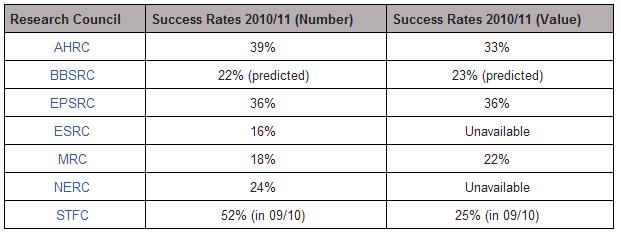 Welcome to RCUK Demand Management week on the blog! There has been a lot of discussion and debate about demand management over the past 12 months or so, particularly in response to the RCUK Efficiency 2011-15 strategy, Research Councils’ delivery plans, and EPSRC’s cooling off period launched in April 2010. The other Research Councils have now started to publish their plans for demand management so it’s timely to look at what this actually is, how each of the Research Councils will enforce it, and what it means for researchers. Every day this week on the blog we will focus on a different element of demand management starting with today’s overview of what demand management actually means…
Welcome to RCUK Demand Management week on the blog! There has been a lot of discussion and debate about demand management over the past 12 months or so, particularly in response to the RCUK Efficiency 2011-15 strategy, Research Councils’ delivery plans, and EPSRC’s cooling off period launched in April 2010. The other Research Councils have now started to publish their plans for demand management so it’s timely to look at what this actually is, how each of the Research Councils will enforce it, and what it means for researchers. Every day this week on the blog we will focus on a different element of demand management starting with today’s overview of what demand management actually means…
What is Demand Management? – Demand management is the term given to the steps taken by RCUK and the Research Councils to reduce the amount of applications they receive.
Why is Demand Management required? – Research Councils currently receive more applications that they are able to support and research institutions currently submit more applications than are likely to be funded. This can be seen in the Research Council success rates which continue to fall year-on-year as the demand for funds increases compared to the limited funding available (see the table below). The costs of administering such large quantities of applications is a huge burden for the Research Councils and reduces the amount of money available to fund research. Large quantities of applications also place a heavy burden on the peer reviewers, thus increasing the risk that the quality of decision-making could be compromised. RCUK note that “there are some proposals submitted which have little or no chance of success” and that steps should be taken at both applicant and institution level to pre-sift these proposals prior to submission, therefore reducing the volume of applications submitted to Research Councils.

What has RCUK asked institutions to do? – RCUK has asked institutions to actively encourage the self-management of demand and quality control, such as through internal sifting processes.
 What resources and processes has BU put in place to support Demand Management? – BU has established an internal peer review scheme (Research Proposal Review Service) which has been up and running in its current form for almost 12 months now. The scheme is managed by Caroline O’Kane and a whopping 21 proposals have been reviewed since July. BU has also invested in proposal writing sessions and bid writing surgeries for researchers. On 23 and 24 November Dr Martin Pickard will be visiting BU to run sessions specifically focusing on writing and preparing applications for Research Council funding – read more and book a place here. Martin’s sessions are excellent and always well received, and I would encourage anyone considering applying for research funding to attend.
What resources and processes has BU put in place to support Demand Management? – BU has established an internal peer review scheme (Research Proposal Review Service) which has been up and running in its current form for almost 12 months now. The scheme is managed by Caroline O’Kane and a whopping 21 proposals have been reviewed since July. BU has also invested in proposal writing sessions and bid writing surgeries for researchers. On 23 and 24 November Dr Martin Pickard will be visiting BU to run sessions specifically focusing on writing and preparing applications for Research Council funding – read more and book a place here. Martin’s sessions are excellent and always well received, and I would encourage anyone considering applying for research funding to attend.
What processes have the Research Councils put in place to enforce Demand Management? – This varies between the Research Councils and we will focus on a different Council every day as part of RCUK Demand Management week on the Blog!











 Nursing Research REF Impact in Nepal
Nursing Research REF Impact in Nepal Fourth INRC Symposium: From Clinical Applications to Neuro-Inspired Computation
Fourth INRC Symposium: From Clinical Applications to Neuro-Inspired Computation ESRC Festival of Social Science 2025 – Reflecting back and looking ahead to 2026
ESRC Festival of Social Science 2025 – Reflecting back and looking ahead to 2026 3C Event: Research Culture, Community & Cookies – Tuesday 13 January 10-11am
3C Event: Research Culture, Community & Cookies – Tuesday 13 January 10-11am Dr. Chloe Casey on Sky News
Dr. Chloe Casey on Sky News ECR Funding Open Call: Research Culture & Community Grant – Application Deadline Friday 12 December
ECR Funding Open Call: Research Culture & Community Grant – Application Deadline Friday 12 December MSCA Postdoctoral Fellowships 2025 Call
MSCA Postdoctoral Fellowships 2025 Call ERC Advanced Grant 2025 Webinar
ERC Advanced Grant 2025 Webinar Horizon Europe Work Programme 2025 Published
Horizon Europe Work Programme 2025 Published Update on UKRO services
Update on UKRO services European research project exploring use of ‘virtual twins’ to better manage metabolic associated fatty liver disease
European research project exploring use of ‘virtual twins’ to better manage metabolic associated fatty liver disease